Cookbook:Halal
Cookbook | Recipes | Ingredients | Equipment | Techniques | Cookbook Disambiguation Pages | Special diets

Halal (حلال) is the Arabic word for 'allowed' or 'permissible', and is used as a generic term used to describe anything which is lawful or allowed in Islam. Halal is a label given to foods which are ceremonially slaughtered according to Muslim traditions, as stated in the Qu'ran. It is similar to the Jewish tradition of Kosher food (i.e., pork is not allowed), and has a common origin in early monotheistic scripture.
Muslims are only allowed to eat meat from animals or birds which have been slaughtered in a particular fashion. The animal must be cut with a sharp knife across the neck in such a fashion that its blood is drained. During the slaughtering, Allah's name is also mentioned as a way of showing gratitude.
- All types of fish are halal, and don't have to be slaughtered. Shi'ites do have a restriction against shellfish, but Sunnis do not.
- Animals which have died naturally of illness or disease are not halal and may not be eaten.
- Carnivorous animals such as tigers, lions, and any other animals which feed on flesh may not be eaten.
- Land scavengers such as pigs, or anything originating from them, are specifically mentioned in the Qur'an as not allowed to be eaten. This means Pork, as well as byproducts like bacon, are not Halal.
- As mentioned before, blood must be drained from meat before consumption. This is because blood itself is haram, and may not be consumed by Muslims. This prohibits recipes which use blood as an ingredient.
- Food sacrificed in the name of other deities is also not permissible.
- Alcohol beverages, or any consumable containing alcohol in it is equally not allowed to be consumed. This is important, as a number of otherwise Halal recipes include alcohol as an ingredient.
- Items which are not Halal are called Haram (حَرَام).